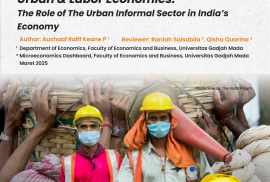As a result of collaboration between Microeconomics Dashboard and Spatial Research in Regional & Sustainable Economics (Sparse) Working Group under the Faculty of Economics and Business UGM, BISSA! published a booklet entitled “Mengelola Sampah dengan Baik untuk Menciptakan Lingkungan yang Berkelanjutan”.
Our booklet is now officially copyrighted and available for access on the Microeconomics Dashboard website!
This booklet was proudly created by the Community Service Team BISSA!, focusing on sustainable waste management practices in general. Through this initiative, we aim to raise awareness and encourage better waste practices that benefit both the community and the environment.


